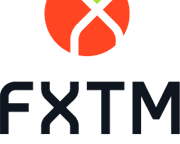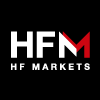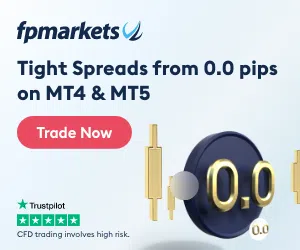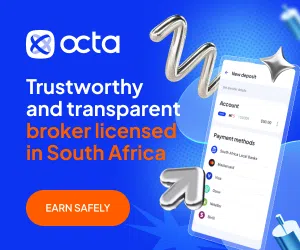For over a decade, FxScouts.co.za has been reviewing forex brokers and provided in-depth analyses. Our extensive research and unique testing methodology ensures that all broker reviews are accurate and fair with hundreds of thousands of data points generated annually. Since 2012, we’ve tested over 180 brokers across global and South African markets. Our team of professionals are frequently cited in global and regional media, shaping market conversations and trends.
-
Best Forex Brokers
Our top-rated Forex brokers
-
Brokers for Beginners
Start trading here
-
Forex Demo Accounts
Learn to trade with no risk
-
ZAR Trading Accounts
Save on conversion fees
-
Lowest Spread Brokers
Raw spreads & low commissions
-
ECN Brokers
Trade with Direct Market Access
-
No-deposit Bonuses
Live trading with no deposit
-
High Leverage Brokers
Extend your buying power
-
Islamic Account Brokers
Best accounts for Muslim traders
-
Market Maker Brokers
Fixed spreads & instant execution
-
All Trading Platforms
Find a platform that works for you
-
TradingView Brokers
The top TradingView brokers
-
MetaTrader4 Brokers
The top MT4 brokers in SA
-
MetaTrader5 Brokers
The top MT5 brokers in SA
-
cTrader Brokers
The top cTrader brokers in SA
-
Forex Trading Apps
Trade on the go from your phone
-
Copy Trading Brokers
Copy professional traders
75-90% of retail traders lose money trading Forex and CFDs. You should consider whether you understand how CFDs and leveraged trading work and if you can afford the high risk of losing your money. We may receive compensation when you click on links to products we review. Please read our advertising disclosure. By using this website, you agree to our Terms of Service.
- FP Markets - Most Trusted Broker
- FXTM - Best Trading Conditions
- HFM - Best Trading Platforms
- AvaTrade - Best Education
- XM - Most Assets Available
Best Forex Brokers in Namibia for 2024
The Forex Industry in Namibia
While the NAMFISA plays a minimal role in the regulation of Forex brokers in Namibia, they do post notices warning the public away from unregulated brokers or trading through third parties.
Recent events have forced the Bank of Namibia to clarify its rules on currency regulation though. In September 2019, the Forex trading community in Namibia was shaken by the arrest of Michael Amushelelo and his business partner Gregory Cloete, who have been accused of running a pyramid scheme.
Amushelelo, a self-described Forex trader, has been accused of fraud and money laundering and is currently awaiting a trial date. He protests his innocence, though the red flags of a scam are all present and correct (the promise of high returns, unregistered investments, referral requests, etc.)
Namibian Forex Regulation
While Amushelelo’s scam has little to do with CFD Forex trading, it did put the Namibian Forex industry under the spotlight and highlighted the lack of regulation around it. Since the arrest, the Bank of Namibia has clarified its Forex trading rules, though these will have little effect on CFD Forex trading as the underlying asset is never actually owned by the trader.
While we can’t expect NAMFISA or the Bank of Namibia to enforce regulation for the local industry any time soon, we do hope that the Amushelelo case will raise awareness enough to make it a policy priority over the coming years. In the meantime, the best advice is to heed NAMFISA’s warnings and only trade with well-regulated international brokers and never trade via a third party.
FAQs
What is the best Forex broker in Namibia?
The best brokers in Namibia are AvaTrade, FXTM and XM. AvaTrade is a great all-around broker with low fees and tight spreads. FXTM is trusted by thousands of traders across Africa and has a great range of account types. XM is the best overall broker, with great customer support and education for new traders.
I am a beginner trader, what should I look for in a broker?
As a beginner trader, choose a broker with an unlimited demo account, as this will give you the opportunity to practice before making a deposit. Limited demo accounts usually expire after 1-3 weeks, which is not enough time to learn how to profit from CFD trading.
Beginner traders should get educational support when starting, and each broker varies significantly in what material they provide. The minimum you should accept is some general videos and articles, but some brokers have invested in creating small trading universities that include video material as well as live webinars hosted by experts.
Each of our reviews has a section on the educational content to help beginner traders decide the best path forward.
Which is the best Forex brokers for beginners?
The Forex broker for beginners is XTB. Customer service is available 24/7 with both one-on-one mentoring and dedicated account managers provided for new traders. Educational material is excellent and is presented via XTB’s Trading Academy, which is both well-structured and clear. Finally, minimum deposit requirements are low, and spreads are tight.
How do you trade Forex in Namibia?
To trade Forex in Namibia you will need a trustworthy Forex broker, which you can find here at FxScouts. Before you start trading, you should open a demo account with the broker so you can gain experience with the Forex market and with the broker’s trading platform. Once you have gained enough experience you will need to deposit funds with the broker via bank transfer or a payment system like Ozow or Neteller. Once your live account is funded, you will be able to start trading.
Is Forex trading legal in Namibia?
Yes, Forex trading is legal in Namibia and you can trade with any Forex broker in the world.
How do I know I can trust a Forex broker?
Four things should be considered when determining if a broker may be trusted – regulation, trade execution method, client funds management, and industry recognition of their achievements.
The more major regulators the broker group is regulated by, the more oversight the group has. The number of regulators overseeing their processes gives a strong indication of the level of trust the government regulatory agencies have in them.
The execution method of trades is another component because if the broker profits from your loss – as is the case with market maker brokers – this can be seen as making the broker less trustworthy.
This is more of a concern if fewer major regulators regulate a market maker. Therefore, a heavily regulated market maker is considered more reputable than one with lesser regulation. It is noteworthy that some market makers have strong reputations and lots of client resources.
Most regulators require strict processes to keep client funds safe. This process includes placing client funds in segregated accounts at major banks in the local jurisdiction. Segregated bank accounts that are audited every evening means that client funds are protected against any bankruptcy.
Industry awards are given to brokers from journalists, financial watchdog organisations and their peers. While it can be argued that these award ceremonies are biased, they remain the best gauge of industry recognition.
Do brokers trade against you?
If the broker is a market maker, then they are the market and will be trading against you by being the counterparty to your trade to create the liquidity you need. Since a vast majority of trades by retail traders are lost, a market maker is making money in most client trades. DMA brokers do not have any conflict of interest and do not trade against you.
How do brokers make money?
Market Makers will make money only from the spread – the difference between the buying and selling price of the currency pair. Since a Market Maker will become the counterparty to any trade, they will also make money when clients lose trades.
DMA brokers will make money from a tight spread and a commission, which is calculated on a per lot amount.
How to deposit with a broker?
Each broker is going to have different deposit methods, but all will have a deposit by credit/debit card and bank transfer option. Most brokers will also accept Neteller or Skrill, which are favoured by many traders because deposits and withdrawals are instant and usually free.
Some will accept regional payment methods, but local deposit methods have not yet been adopted in Namibia. On occasion, brokers will accept Bitcoin deposits, and PayPal in addition to standard currency.
Which broker should I choose?
Traders have different requirements of Forex brokers, and thus there is no single best choice. This is how we compare them, and we offer insight into your choices. At the top of this article, there is a list of those that we believe are the best brokers for traders based on their reputation, platform, trading conditions and resources available to beginners.
How can I report scam brokers?
If you believe you have been scammed by your broker, the first thing to do is warn others and tell your story. We have a report a scam broker form which we use to gather information so that we get the word out. If you have been scammed, please complete the form.
Forex Risk Disclaimer
Trading Forex and CFDs is not suitable for all investors as it carries a high degree of risk to your capital: 75-90% of retail investors lose money trading these products. Forex and CFD transactions involve high risk due to the following factors: Leverage, market volatility, slippage arising from a lack of liquidity, inadequate trading knowledge or experience, and a lack of regulatory protection. Traders should not deposit any money that is not considered disposable income. Regardless of how much research you have done or how confident you are in your trade, there is always a substantial risk of loss. (Learn more about these risks from the UK’s regulator, the FCA, or the Australian regulator, ASIC).
Our Rating & Review Methodology
Our Broker Awards and Forex Rankings Report and Directory of CFD Brokers to Avoid are the result of extensive research on over 180 Forex brokers. These resources help traders find the best Forex brokers – and steer them away from the worst ones. These resources have been compiled using over 200 data points on each broker and over 3000 hours of research. Our team conducts all research independently: Testing brokers, gathering information from broker representatives and sifting through legal documents. Learn more about how we rank brokers.
Editorial Team

Chris Cammack
Head of Content
Chris joined the company in 2019 after ten years experience in research, editorial and design for political and financial publications. His background has given him a deep knowledge of international financial markets and the geopolitics that affects them. Chris has a keen eye for editing and a voracious appetite for financial and political current affairs. He ensures that our content across all sites meets the standards of quality and transparency that our readers expect.
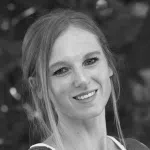
Alison Heyerdahl
Senior Financial Writer
Alison joined the team as a writer in 2021. She has a medical degree with a focus on physiotherapy and a bachelor’s in psychology. However, her interest in forex trading and her love for writing led her to switch careers, and she now has over eight years experience in research and content development. She has tested and reviewed 100+ brokers and has a great understanding of the Forex trading world.
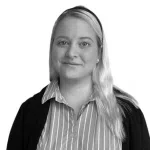
Ida Hermansen
Financial Writer
Ida joined our team as a financial writer in 2023. She has a degree in Digital Marketing and a background in content writing and SEO. In addition to her marketing and writing skills, Ida also has an interest in cryptocurrencies and blockchain networks. Her interest in crypto trading led to a wider fascination with Forex technical analysis and price movement. She continues to develop her skills and knowledge in Forex trading and keeps a close eye on which Forex brokers offer the best trading environments for new traders.
Stay updated
This form has double opt in enabled. You will need to confirm your email address before being added to the list.


































